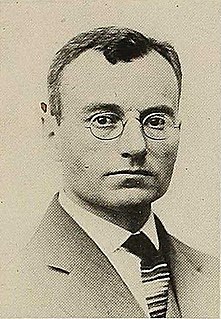A Quote by Carl L. Becker
The value of history is, indeed, not scientific but moral: by liberalizing the mind, by deepening the sympathies, by fortifying the will, it enables us to control, not society, but ourselves - a much more important thing; it prepares us to live more humanely in the present and to meet rather than to foretell the future.
Related Quotes
I must say that in my own mind, I think what's important is for us, as a society, to radically reduce the consumption of meat. This is more important than some fraction of us become moral saints and become vegetarians so it would be much better if we would reduce meat consumption by three quarters of each of us as an individuals would only eat one-quarter as much meat as we do now then that half of the population should become vegetarian. We should see this as a collective challenge rather than an issue about individual, moral period.
History is not truth versus falsehoods, but a mixture of both, a mélange of tendencies, reactions, dreams, errors, and power plays. What's important is what we make of it; its moral use. By writing history, we can widen readers' thinking and deepen their sympathies in every direction. Perhaps history should show us not how to control the world, but how to enlarge, deepen, and discipline ourselves.
Let's have a merry journey, and shout about how light is good and dark is not. What we should do is not future ourselves so much. We should now ourselves. "Now thyself" is more important than "know thyself." Reason is what tells us to ignore the present and live in the future. So all we do is make plans. We think that somewhere there are going to be green pastures. It's crazy. Heaven is nothing but a grand, monumental instance of future. Listen, now is good. Now is wonderful.
There are some things more important than ourselves - more important than the limits of the present, and the whims of the now. There is a future to build and protect. And if we're going to make that future as reality, we have to stop fighting among ourselves. We have to end dissent whenever we find it. We have to trust one another again.
We will never have total control over this extraordinary dimension. Time will warp and confuse and baffle and entertain however much we learn about its capacities. But the more we learn, the more we can shape it to our will and destiny. We can slow it down or speed it up. We can hold on to the past more securely and predict the future more accurately. Mental time-travel is one of the greatest gifts of the mind. It makes us human, and it makes us special.
The primary function of poetry, as of all the arts, is to make us more aware of ourselves and the world around us. I do not know if such increased awareness makes us more moral or more efficient. I hope not. I think it makes us more human, and I am quite certain it makes us more difficult to deceive.
It is more helpful to think of dreams as reflections of the present rather than as pictures of the future. A dream of a car out of control, for example, does not indicate that a car accident will occur in the future. It does mean, however, that the dreamer is feeling out of control in his or her life right now. It is important not to be superstitious about dreams.
What's been important in my understanding of myself and others is the fact that each one of us is so much more than any one thing. A sick child is much more than his or her sickness. A person with a disability is much, much more than a handicap. A pediatrician is more than a medical doctor. You're MUCH more than your job description or your age or your income or your output.
We are living in a time of trouble and bewilderment, in a time when none of us can foresee or foretell the future. But surely it is in times like these, when so much that we cherish is threatened or in jeopardy, that we are impelled all the more to strengthen our inner resources, to turn to the things that have no news value because they will be the same to-morrow that they were to-day and yesterday — the things that last, the things that the wisest, the most farseeing of our race and kind have been inspired to utter in forms that can inspire ourselves in turn.
It is the Fourth Instinct (the spirit - RJ) that urges us to exceed ourselves ... by awakening our intuitive selves, and striving to be all that we were intended to be. It takes us beyond self-centeredness and enables us to resist the combined forces of indifference and meaninglessness. It awakens us to a sense of responsibility for those most in need of our society as well as for that world that future generations will inherit.
Film is more than the twentieth-century art. It's another part of the twentieth-century mind. It's the world seen from inside. We've come to a certain point in the history of film. If a thing can be filmed, the film is implied in the thing itself. This is where we are. The twentieth century is on film. You have to ask yourself if there's anything about us more important than the fact that we're constantly on film, constantly watching ourselves.
The practice of patience guards us against losing our presence of mind. It enables us to remain undisturbed, even when the situation is really difficult. It gives us a certain amount of inner peace, which allows us some self-control, so that we can choose to respond to situations in an appropriate and compassionate manner, rather than being driven by our disturbing emotions.








































